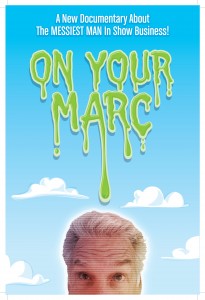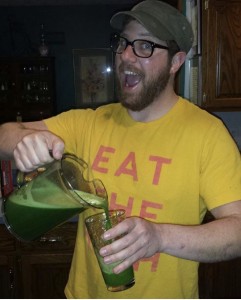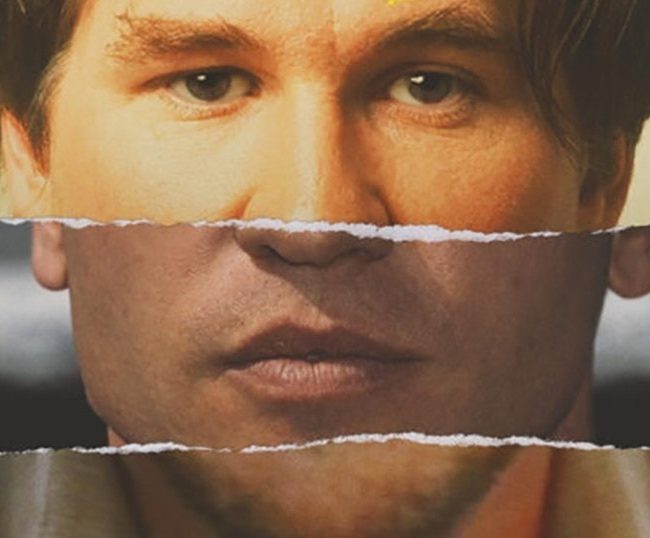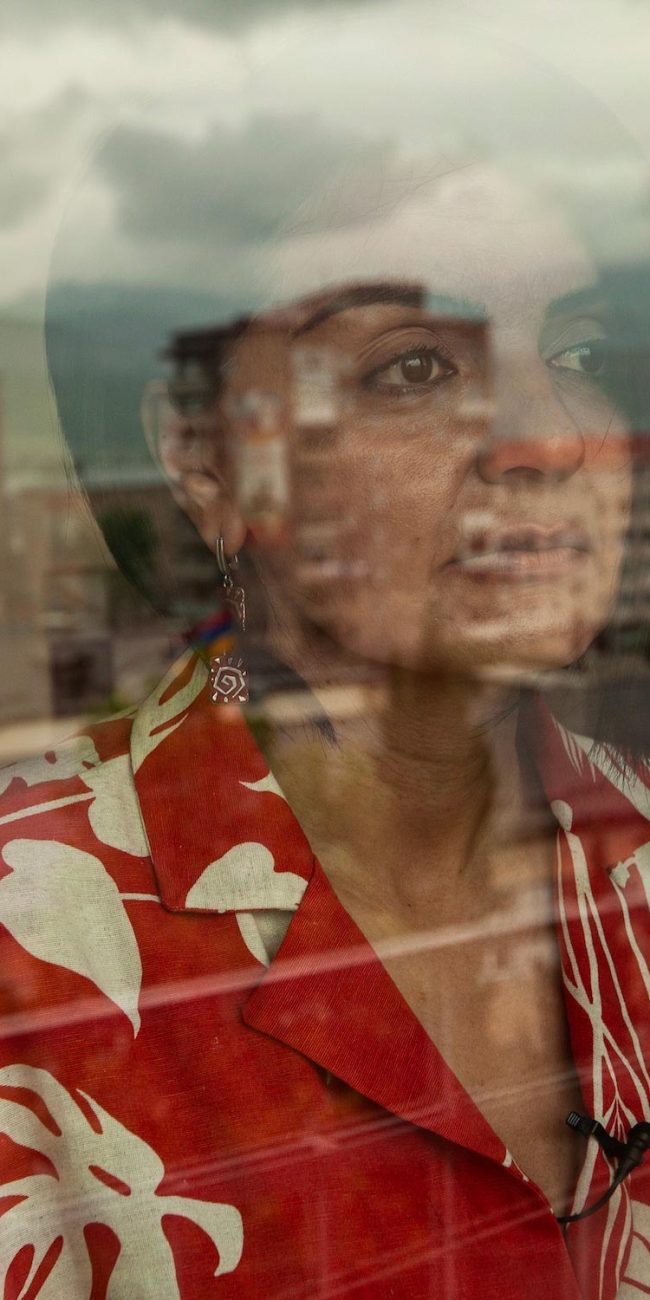A Conversation with Mathew Klickstein (ON YOUR MARC)
 I spoke by phone with filmmaker and author Mathew Klickstein (Slimed!: An Oral History of Nickelodeon’s Golden Age) on Wednesday, October 18, 2017, just over a week before the end of the national tour for his new documentary On Your Marc. The film profiles the life and career of television personality Marc Summers, who rose to fame in the 1980s as the host of Nickelodeon’s Double Dare, and later continued as the host of many other popular shows, including Food Network’s Unwrapped. Beyond the interest of the subject matter, On Your Marc is noteworthy for how Klickstein has chosen to roll it out, setting up an introductory live-event tour with screenings in Los Angeles, New York, Philadelphia, Austin, Baltimore and Chicago (the last stop, set for October 26), with Summers in attendance at each one. In the interest of full disclosure, I first met Klickstein a little under a year ago, when he interviewed me for an article on Jewish Oscar hopefuls for the Baltimore Jewish Times, and we then subsequently co-hosted a movie screening at the JCC of Greater Baltimore. Also, since I watched the film a few months ago, Klickstein has apparently added a special credit to me in the final title crawl. Below is a transcript of our conversation, edited for brevity and clarity.
I spoke by phone with filmmaker and author Mathew Klickstein (Slimed!: An Oral History of Nickelodeon’s Golden Age) on Wednesday, October 18, 2017, just over a week before the end of the national tour for his new documentary On Your Marc. The film profiles the life and career of television personality Marc Summers, who rose to fame in the 1980s as the host of Nickelodeon’s Double Dare, and later continued as the host of many other popular shows, including Food Network’s Unwrapped. Beyond the interest of the subject matter, On Your Marc is noteworthy for how Klickstein has chosen to roll it out, setting up an introductory live-event tour with screenings in Los Angeles, New York, Philadelphia, Austin, Baltimore and Chicago (the last stop, set for October 26), with Summers in attendance at each one. In the interest of full disclosure, I first met Klickstein a little under a year ago, when he interviewed me for an article on Jewish Oscar hopefuls for the Baltimore Jewish Times, and we then subsequently co-hosted a movie screening at the JCC of Greater Baltimore. Also, since I watched the film a few months ago, Klickstein has apparently added a special credit to me in the final title crawl. Below is a transcript of our conversation, edited for brevity and clarity.
Hammer to Nail: So, your film is called On Your Marc. Who, then, is Marc Summers?
Mathew Klickstein: Marc Summers is a well-known television icon. He was ubiquitous on television throughout the ’80s and ’90s. Anyone who grew up watching Nickelodeon would have known him from the show Double Dare. They shot almost 550 episodes, and it was really the show that helped launch Nickelodeon into the mainstream. When people look back on classic Nickelodeon, as they’re doing more and more with all the ’80s nostalgia these days, you can’t help but think about Double Dare and the Double Dare slime and Marc Summers, to many the face of the network during that time.
Additionally, he had a very similar position for Food Network. His show Unwrapped, which he hosted for almost 15 years – and which still holds the rank of being the longest-run show on the network – was not the first show on Food Network, but again really helped to launch that network into the stratosphere in a way that the earlier program had not. So, in a way you could say that Marc Summers personally launched two major networks into the mainstream.
In more recent years, he has been mainly behind the camera. He’s helped to create and produce a number of shows, mainly for Food Network. He’s also done a lot for Travel, and for Discovery, and he’s poked around a lot there in a way that a lot of people probably don’t even know about. But that’s mainly where he’s lived for the last couple of years. Of course, he pops up a lot on the shows of friends of his, like Guy Fieri and Rachael Ray – also The View – and he guest-hosts a lot of different shows and competitions. So, that’s who Marc Summers is. He’s also a 65-year-old grandfather, and someone I’ve become very close with over the past 5 years, and I’m happy to tell his story.
HtN: You say he helped build two networks, so as Frank Capra was to Columbia in the 1930s, Marc Summers was to Nickelodeon and Food Network. Very nice! So, you would describe the movie as a profile of his life and career, correct?
MK: It is that, yes. We took what is – unfortunately, these days – an unconventional approach to the film. Typically, a pop-culture documentary like this has a pretty conventional format: you end up with a series of talking heads of fans, colleagues, and a few other celebrities just talking about the person or the film. There’s rarely much of a story; there’s rarely much actually happening; it’s kind of a rambling oral history of who that person is or what that film might be. You end up with some 1980s video-game music on the soundtrack, maybe it’s the 25th anniversary of the show the film is talking about, or you talk about whether or not they’re going to run the show again, and then the film is done.
What we did with our film, and why we feel that it’s something rather unique, is that it’s not just a meandering talking-head film about Marc Summers. There’s an actual story and an actual narrative, which we find very compelling, especially for someone who might know who Marc is, or might not know or necessarily care. It really focuses on his one-man theater show about his life, based on a book he wrote, back in 1999, about his struggles with OCD. We show him struggling to put the show together; we show him rehearsing; we show him struggling to overcome the challenges he had in putting the show together, including dealing with memory issues from a car accident he had; and just the pressure of trying to do a theater show after never having really done something like that before.
So, you really get a full story of this guy who is trying to build, create and produce something, in real time. And because the show is about his life, we were able to use little moments from his rehearsal and from the show, itself, to sort of digress and show things like his mom talking, or some of his celebrity friends, like Neil Patrick Harris and the like. So, we were able to sneak in some of those more conventional elements, but the film has a real beginning, middle and end. More than anything, we wanted to create, all along, a real-life version of Birdman. That’s how we see the film: he’s an ’80s/’90s icon who is trying to move into a new platform, a new medium, and we watch him attempting to do that. And meanwhile, we sneak in some pie fights and celebrity guests and a few other things.
HtN: So now let’s segue into the other unique aspect of the film, which is your release strategy and marketing plan. Could you discuss that?
MK: We knew from day 1, since Marc is such an unconventional person and the film is also relatively unconventional, that we wanted to have a release that would resonate with that sensibility and the kinds of fans and community that have built up around Marc and this classic ’80s/’90s pop-culture mentality. (laughs) It’s funny that we call the ’80s and ’90s “classic,” but I guess that’s where we are now, almost 30 or 40 years later. So, from very early on, we knew we wanted to bring this film directly to the people; we wanted to bring it directly to the fans. And even in the early stages, when we were getting invitations to certain festivals and conventions, we wanted to establish our own network of screenings and, in particular, live events.
I was just speaking with a barista at a coffee shop this morning, who has been following along with everything we’re doing, and he immediately got that, yeah, people really want to meet Marc Summers. That’s part of the experience. And though not everyone is going to be able to do that when we have the larger release of the film, later on, we have an opportunity right now to show the film in different locations around the country, and to have these live events where, everywhere we go, we have these different community members, local bands, local celebrities, local partners involved. In the case of Brooklyn and Austin, it was Alamo Drafthouse, but in other places we work with other organizations: radio stations, newspapers, whatever it might be. So, it is not just our going to these different places as a traveling celebrity and a traveling circus, but instead as a localized community experience.
The one in Chicago, for example [on October 26], is going to be at a place called The Hideout, which is actually a very small location. We wanted to do that, intentionally, to have one of them be a very intimate experience. And at that space, it’s two friends of mine who have a show called Mr. and Mrs. Wednesday Night, which is sort of a comedy/music show, and Marc will just be part of their weekly show, and then we’ll also show the film. I don’t even know what they’re doing, but because of that, they’ll be able to bring in people from their own community to see the film, to meet Marc and to talk about it.

So, really what we have here is a multifaceted approach where the local community, the local newspapers and the local radio will be talking about our film and about Marc and that’s good publicity for us on a very grassroots level. And it’s good for the fans, too, because they’ll actually get to see the film and to meet Marc, and to have fun getting slimed by Marc, and watching physical challenges and all these other things, as part of the experience of the film. And we may do a few more of these events, as well, since it’s been very successful, thus far. We’ve been selling out and people have been having a blast. And, you know, some of these things go on for 3 to 4 hours, and nobody leaves. It’s a real, full vaudevillian experience, which you miss when a film goes straight to a streaming service, or even in a typical limited theatrical run.
Right, and for those who may not know, in the show Double Dare, “getting slimed” was a regular part of the show, so this sounds like people who were fans can relive that experience. So where did you start the tour, and where have you gone?
MK: We started in Los Angeles; we then went to Brooklyn; we went to Philadelphia; we went to Austin, Texas; we went to Baltimore; and then we have one more, in Chicago on October 26. Again, we’ve gotten numerous invitations to go to places around the country, everywhere from Minnesota to Indiana to Florida. It’s really just a matter of time and resources. I’ll add here that we have not spent a single penny on any of this. This has been about the hustle, about working every single possible connection we have.
Just like with the film, itself, which was greatly crowd-sourced by friends of ours all over the country, we just pulled every favor we had. We talked with everyone we possibly could and we were able to put these events together with local organizations that simply loved the film, loved Marc, and loved the idea of breaking through the typical film-festival release pattern. And some of the venues we have gone to are themselves unconventional: in Philadelphia, we went to a concert hall, and there were actually a couple of local bands that played, as well. Each one of these has been like a franchise. And we’ve done it with very little resources, but we made it happen.
HtN: So, what next? The tour ends … now what?
MK: So, we’re already talking to some entities that are interested in buying the film. And so we’ll go through those meetings, and we will also reach out to a few other entities that we’re interested in working with. We’re definitely going to have a full release at a particular point. This was really about getting the word out, letting people know what we were doing, in the same way that you would with film festivals or pop-culture conventions. This is our own network, and we set it up and made it work, inspired by the 1980s DIY campaigns of bands like Fugazi, as well as the stories of Michael Azerrad’s Our Band Could Be Your Life. And that’s the kind of thing that we can bring to a distributor and say, “Hey, look at everything that we’ve done, already, and look at all these people that are interested in the film. Look at all these articles that we’ve had generated. Are you ready to partner up with us to get this film out there?” So, sale is definitely next.
HtN: Well, I wish you the best of luck. You’ve made a film about a compelling subject, and it sounds like you are indeed doing quite the hustle. My best wishes to you and congratulations on the film.
MK: Thank you!
– Christopher Llewellyn Reed (@ChrisReedFilm)












Darlene
What a fascinating interview! I missed a local screening of On Your Marc but hope to catch it soon on the interwebs!